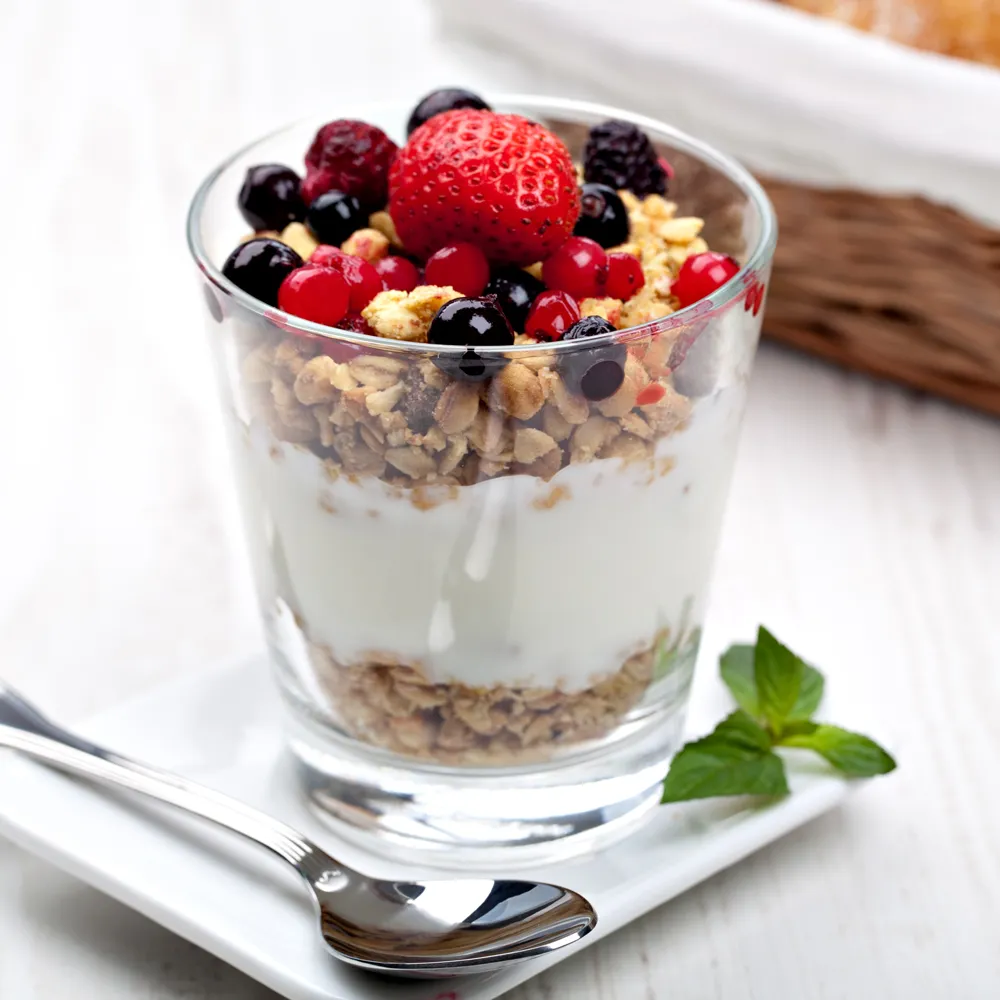Overview of Yogurt and Weight Loss
Contents
Yogurt often takes the spotlight in discussions about health and weight management. Its ingredients, like protein and probiotics, can significantly influence body weight by enhancing metabolism and increasing satiety. Which yogurt is best for weight loss? This makes yogurt an excellent choice for anyone looking to maintain, manage, or lose weight.
The Role of Protein in Yogurt
Protein is a powerhouse nutrient vital for weight loss, and yogurt is a great source of it. It helps build muscle and burns fat by increasing calorie expenditure. Greek yogurt, in particular, is beneficial due to its higher protein content. This type of yogurt can keep you feeling full longer, reducing the chance of overeating.
Probiotics and Digestive Health
The probiotics in yogurt are crucial for maintaining a healthy digestive system. They help regulate the gut flora, which can improve digestion and boost immune functionality. A healthy gut reduces inflammation and aids in the better absorption of nutrients, crucial for maintaining an optimal metabolism.

The Nutritional Power of Yogurt
When selecting yogurt for weight loss, it’s essential to look for varieties that are low in calories, high in protein, and low in added sugars. Greek yogurt, for instance, stands out as a powerful weight loss ally. Rich in protein, Greek yogurt can help keep you feeling full longer, which can curb the temptation to overeat. Additionally, its thick consistency makes it an excellent substitute for higher-calorie ingredients like sour cream or mayonnaise.
Another great option is plain, unsweetened yogurt, which allows you to control the sweetness factor with your additions—think fresh fruits, nuts, or a drizzle of honey—without the worry of hidden sugars. Furthermore, yogurt contains probiotics, which can support digestive health and may aid metabolism. If you’re lactose intolerant or prefer a dairy-free option, plant-based yogurts made from almond, coconut, or soy can offer similar benefits, especially if they are fortified with protein.
By choosing the right type of yogurt and being mindful of your overall dietary choices, you can enjoy this delicious food while successfully working towards your weight loss goals. Keep reading to discover some of the best yogurt brands and flavors that can help you on your journey!
Types of Yogurt Compared
When exploring the best yogurt for weight loss, it is essential to understand the differences among various types. Each variety holds distinct nutritional profiles and benefits that can help cater to individual dietary goals.
Greek Yogurt: High Protein and Low Sugar
Greek yogurt stands out primarily because of its rich protein content and lower sugar levels. The straining process it undergoes removes excess whey, concentrating the protein. High protein levels promote satiety, making Greek yogurt a perfect choice for weight management. For those monitoring their sugar intake, Greek yogurt naturally contains less sugar compared to regular yogurt, aligning well with a low-sugar diet.
Icelandic Yogurt: Creamy and Satisfying
Icelandic yogurt, also known as skyr, is another excellent option for those looking to lose weight. Similar to Greek yogurt, it is made by straining, which results in a creamy, thick texture that many find satisfying. It is typically higher in protein than even Greek yogurt, providing a substantial meal that helps curb hunger for longer periods.
Regular vs. Strained Yogurts
Regular yogurts are typically less dense in protein due to the absence of the straining process. They often contain more natural sugars and less protein, which might not be ideal for those strictly managing calorie intake. In contrast, strained yogurts like Greek and Icelandic have higher protein content and fewer carbohydrates due to the removal of whey. This makes them more effective for weight management and helps maintain satiety throughout the day.

Evaluating Yogurt’s Nutritional Content
When choosing yogurt for weight loss, inspect its nutritional label closely.
Importance of Low Sugar Content
Yogurt with low added sugar is key for a healthy pick. The American Heart Association suggests women limit added sugar to 25 grams a day, men to 36 grams. High sugar intake can derail weight loss efforts. Check labels to avoid high sugar yogurts.
Benefits of High Protein
High-protein yogurts, like Greek or Icelandic, support weight loss. They keep you full, reducing the urge to snack. Look for yogurts with at least 5 grams of protein per serving.
Optimal Fat Content for Dietary Goals
Yogurts come in various fat contents: nonfat, low-fat, and full-fat. Your choice should match your dietary needs. Some may need low-fat options for heart health. Others may prefer full-fat yogurts for better taste and fullness.
Non-Dairy Yogurt Options
For those with dietary restrictions or preferences, non-dairy yogurt options are abundant. Lactose intolerance, vegan lifestyles, and milk allergies no longer mean sacrificing the benefits of yogurt.
Soy and Coconut-Based Yogurts
Soy-based yogurts are the closest in nutritional value to dairy yogurts, offering protein and often fortified with calcium and vitamin D. Coconut-based yogurts tend to be creamier but watch for added sugars that can undermine weight loss efforts.
Choosing soy or coconut yogurts must be strategic. Aim for brands with low added sugars and plenty of protein. These help in maintaining low-calorie intake while still feeling full, aiding weight management.
Evaluating Nutritional Value of Non-Dairy Alternatives
When selecting a non-dairy yogurt, check the label as you would with dairy yogurts. High protein, low sugar, and vitamin fortification are key. Remember, non-dairy does not automatically mean healthier; ingredients should align with weight loss goals.
Non-dairy yogurts can be part of a weight loss regimen if chosen carefully. Their plant-based origins also add variety to your diet, contributing to overall wellness.

Adding Healthy Toppings to Yogurt
Enhancing yogurt with toppings bolsters both flavor and nutritional value. Key additions to consider include fruits, nuts, chia seeds, and granola.
Integrating Fruits and Nuts
Fruits and nuts bring natural sweetness and a crunch to your yogurt. They add vital nutrients such as vitamins, minerals, and healthy fats. Apples, bananas, and berries are excellent fruit choices. Almonds, walnuts, and pecans are suitable nut options.
Mix your favorite fruits and nuts into plain yogurt. This boosts fiber and antioxidant intake. The combination helps maintain fullness, curbing the urge to snack.
Utilizing Chia Seeds and Granola
Chia seeds and granola further enrich yogurt. Chia seeds offer omega-3s and fiber, aiding in weight management. Granola, especially when homemade or low-sugar, offers a satisfying crunch.
Sprinkle chia seeds over your yogurt. Let them sit for a few minutes to soften. Add a scoop of granola for texture. Ensure your granola is low in added sugars to keep calorie count in check.
These toppings transform plain yogurt into a more exciting, nutritious meal or snack. They are simple steps to add variety while supporting weight loss goals.
Strategic Incorporation of Yogurt into Diets
To effectively incorporate yogurt for weight loss, consider it as a meal or snack.
Yogurt as a Meal Replacement
Using yogurt as a meal replacement can boost weight loss efforts. For breakfast or lunch, yogurt offers a quick, nutritious option. Greek or Icelandic varieties, packed with protein, keep you full for hours. Mix in fruits, nuts, or seeds to add fiber and vitamins, making a well-rounded meal.
Look for low-sugar yogurt, as sugar can hinder weight loss. Nonfat or low-fat options may be ideal, especially if you’re watching your calorie intake. Remember, balance is key: include a balance of protein, fat, and carbohydrates to support your weight loss and overall health.
Snacking on Yogurt for Satiety
Yogurt works well as a filling snack. It helps control hunger between meals. Regular yogurt often has more sugar and less protein. So, choose Greek or Icelandic yogurt for a protein boost. It’s also good to choose plain yogurt and add your own toppings, like chia seeds or almonds, for extra nutrients and flavor.
Plan yogurt snacks for mid-morning or afternoon. This simple strategy can prevent overeating at meal times. Yogurt snacks are handy, healthy, and versatile, making weight management tasty and satisfying.

Conclusion: Choosing the Right Yogurt for Weight Loss
When it comes to incorporating yogurt into your weight loss journey, the key is to select varieties that align with your nutritional goals while satisfying your palate. Yogurt can be a powerful addition to your diet, offering protein, probiotics, and essential nutrients that promote satiety and gut health. However, not all yogurts are created equal.
Greek yogurt stands out as a top option due to its high protein content, which helps curb hunger and maintain muscle mass during weight loss. Opt for plain Greek yogurt, as flavored varieties often contain added sugars that can counteract your weight loss efforts. Whether enjoyed plain, drizzled with honey, or topped with fresh fruits and nuts, it provides a filling snack or meal base.
For those seeking lower calorie options, skyr—a traditional Icelandic yogurt—offers a similar protein punch with fewer calories and sugar. And if you’re lactose intolerant or prefer plant-based alternatives, options like almond, coconut, or soy yogurt are becoming increasingly fortified with protein and probiotics, ensuring that you don’t miss out on the benefits of yogurt.
Moreover, it’s essential to check the ingredient labels. Look for yogurts that contain live and active cultures, as these probiotics not only aid digestion but also support a healthy metabolism. Additionally, consider portion control; while yogurt is a nutritious option, excessive consumption may lead to unwanted calorie intake.
